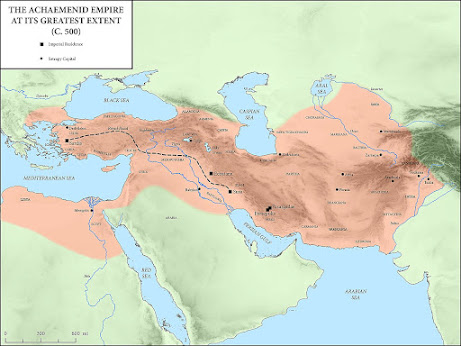பாரசீகத்தை பொமு 5ம் நூற்றாண்டில் ஆட்சி செய்த மன்னர் தரியூஸ் என்பவர் கல்லறை உள்ளது, அதில் அவர் இன்றைய இமய மலை அருகில் உள்ள காந்தாரப் பகுதியை ஹி(ந்)து என அழைக்கிறார்.
Tomb of Darius the Great
Coordinates: 29°59′20″N 52°52′29″E
One of the tombs is explicitly identified by an accompanying inscription to be the tomb of Darius I (r. 522–486 BCE). The other three tombs are believed to be those of Xerxes I (r. 486–465 BCE), Artaxerxes I (r. 465–424 BCE), and Darius II (r. 423–404 BCE); the fifth tomb (incomplete) might be that of Artaxerxes III (r. 358–338 BCE) or the last Achaemenid king, Darius III (r. 336–330 BCE). The tombs were looted extensively following the conquest of Persia by Alexander the Great.
DNa inscription:An inscription by Darius I, dating from c. 490 BCE and generally referred to as the "DNa inscription" (Darius Naqsh-i Rostam inscription "a") in scholarly works, appears in the top-left corner of the façade of his tomb and mentions his conquests as well as his various achievements. Its exact date is not known, but it is assumed to be from the last decade of his reign. Like several other of Darius' inscriptions, the territories controlled by the Achaemenid Persian Empire (which reached its territorial zenith under Darius' rule) are clearly listed.
A great god is Ahuramazda, who created this earth, who created yonder sky, who created man, who created happiness for man, who made Darius king, one king of many, one lord of many.
I am Darius the great king, king of kings, king of countries containing all kinds of men, king in this great earth far and wide, son of Hystaspes, an Achaemenid, a Persian, son of a Persian, an Aryan, having Aryan lineage.
King Darius says: By the favor of Ahuramazda these are the countries which I seized outside of Persia; I ruled over them; they bore tribute to me; they did what was said to them by me; they held my law firmly; Media, Elam, Parthia, Aria, Bactria, Sogdia, Chorasmia, Drangiana, Arachosia, Sattagydia, Gandhara [Gadâra], India [Hiduš], the haoma-drinking Scythians, the Scythians with pointed caps, Babylonia, Assyria, Arabia, Egypt, Armenia, Cappadocia, Lydia, the Greeks [Yaunâ], the Scythians across the sea [Sakâ], Thrace, the petasos-wearing Greeks [Yaunâ], the Libyans, the Nubians, the men of Maka and the Carians.
King Darius says: Ahuramazda, when he saw this earth in commotion, thereafter bestowed it upon me, made me king; I am king. By the favor of Ahuramazda I put it down in its place; what I said to them, that they did, as was my desire.
If now you shall think that "How many are the countries which King Darius held?" look at the sculptures [of those] who bear the throne, then shall you know, then shall it become known to you: the spear of a Persian man has gone forth far; then shall it become known to you: a Persian man has delivered battle far indeed from Persia.
Darius the King says: This which has been done, all that by the will of Ahuramazda I did. Ahuramazda bore me aid, until I did the work. May Ahuramazda protect me from harm, and my royal house, and this land: this I pray of Ahuramazda, this may Ahuramazda give to me!
O man, that which is the command of Ahuramazda, let this not seem repugnant to you; do not leave the right path; do not rise in rebellion! — DNa inscription of Darius
மெகஸ்தனிஸ் பொமு.3ம் நூற்றாண்டில் எழுதிய இந்திய பயண நூலின் பெயர் "இந்திகா"
.jpeg)
.jpeg) இஸ்ரேலின் எபிரேயப் புராணக் கதை பைபிள் கதைகளில் இந்த தரியூ உண்டு, ஆனால் பைபிள் கதைகளில் உள்ள சம்பவம் எல்லாமே முழு கப்சா என அறிஞர்கள் தெளிவாக ஏற்கவே இவை உதவியது
இஸ்ரேலின் எபிரேயப் புராணக் கதை பைபிள் கதைகளில் இந்த தரியூ உண்டு, ஆனால் பைபிள் கதைகளில் உள்ள சம்பவம் எல்லாமே முழு கப்சா என அறிஞர்கள் தெளிவாக ஏற்கவே இவை உதவியது






.jpeg)
.jpeg)
No comments:
Post a Comment